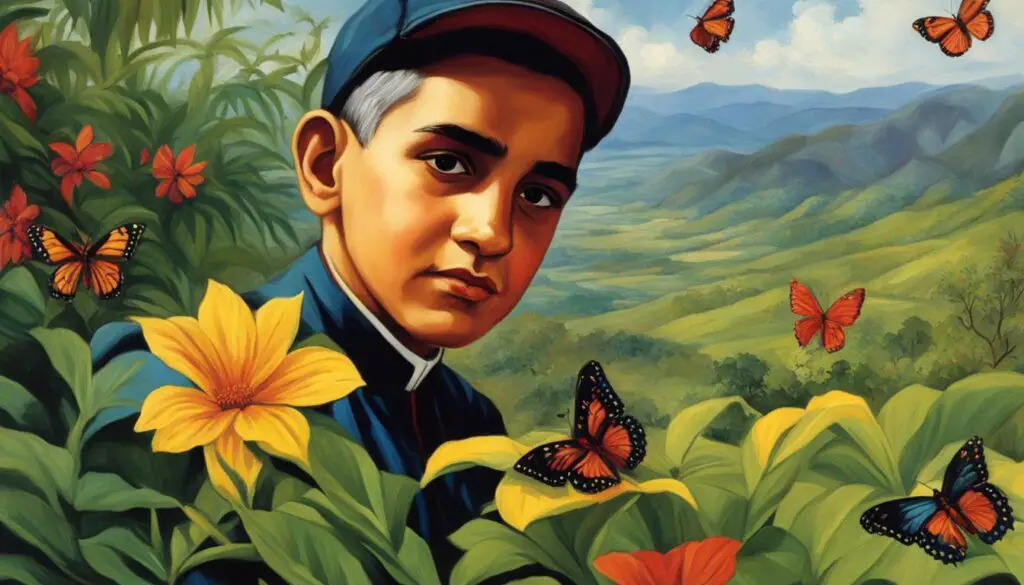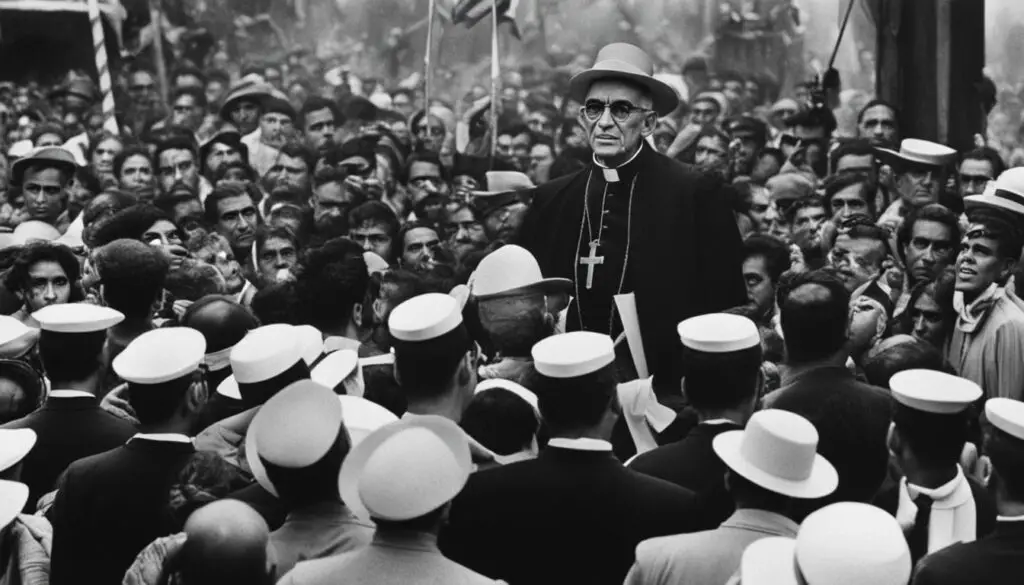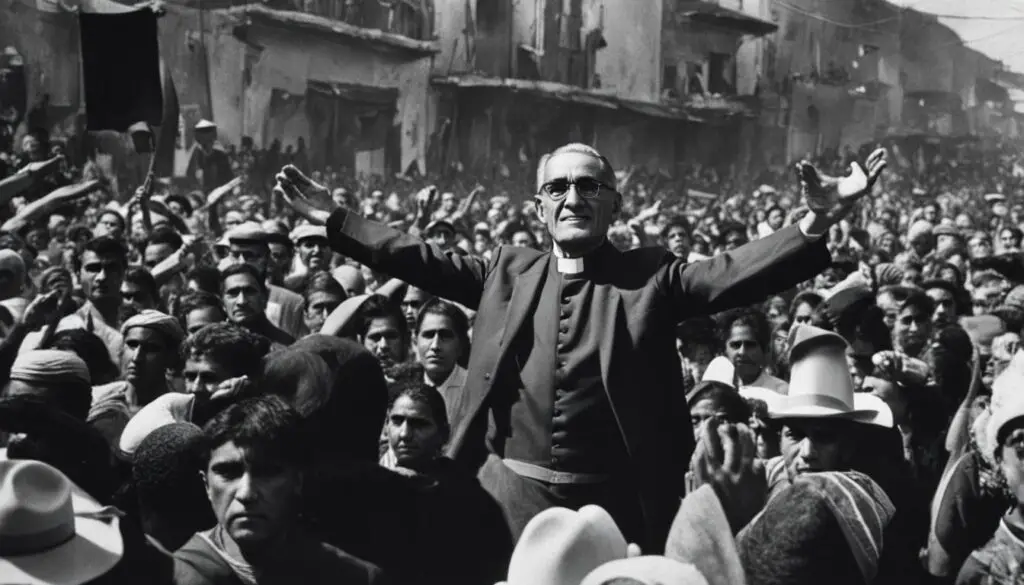Archbishop Óscar Romero, the Salvadoran bishop and martyr, is revered for his unwavering commitment to social justice and human rights. As a prominent figure in the Catholic Church, Romero dedicated his life to advocating for the marginalized and oppressed in El Salvador.
Born on August 15, 1917, in Ciudad Barrios, El Salvador, Romero grew up in a humble family and developed a deep sense of faith from an early age. After becoming a priest and serving in various roles within the church, Romero underwent a profound transformation that fueled his passion for justice.
In the context of pervasive social and economic injustice, Romero became the voice of the voiceless, fearlessly denouncing the government and military for their human rights abuses. His powerful words and actions provided hope and inspiration to countless Salvadorans, sparking a movement for social change.
Despite facing relentless opposition and death threats, Romero remained steadfast in his mission, driven by his core values of justice, love, and solidarity. His commitment to these principles, rooted in liberation theology, set an example for others and galvanized a generation of activists.
Tragically, Archbishop Óscar Romero was assassinated in 1980 while saying Mass. His death served as a catalyst for further unrest in El Salvador and a rallying cry for those fighting for justice. In recognition of his martyrdom and the enduring impact of his work, he was beatified by Pope Francis in 2015 and canonized as a saint in 2018.
The legacy of Archbishop Óscar Romero remains a source of inspiration and a reminder of the ongoing struggle for human rights and social justice. His example teaches us the vital importance of standing up for what is right, even in the face of adversity, and working towards a more just and inclusive society.
Key Takeaways
- Archbishop Óscar Romero was a Salvadoran bishop and martyr who dedicated his life to social justice and human rights.
- He spoke out against social and economic injustice, becoming a fearless advocate for the marginalized and oppressed.
- Romero’s unwavering commitment to justice and his core values of love and solidarity inspired a generation of activists.
- Despite facing significant challenges and opposition, he remained steadfast in his mission and continued to fight for what was right.
- Archbishop Óscar Romero’s legacy serves as a reminder of the power of individual action and the ongoing struggle for a more just society.
Early Life and Transformation
Óscar Romero, a Salvadoran bishop who became an influential figure for social justice, was born on August 15, 1917, in Ciudad Barrios, El Salvador. Raised in a humble family, Romero developed a deep sense of faith from a young age.
Following his ordination as a priest, Romero dedicated himself to serving the church and its members. He served in various roles within the Catholic Church, including as a parish priest and a seminary rector. However, it was through his experiences and encounters with the struggles faced by the poor and marginalized that Romero underwent a profound transformation.
This transformation propelled Romero to become a fearless advocate for those who had been oppressed and overlooked. He recognized the need for systemic and structural change in society and embraced a new mission that centered on standing up for justice and defending the rights of the marginalized.
During this period, Romero drew inspiration from his unwavering faith, which fueled his passion for social transformation. His commitment to the teachings of the Catholic Church and the message of love and compassion guided his actions and became the driving force behind his tireless advocacy.

Throughout his life, Archbishop Óscar Romero’s dedication to transforming society and uplifting the vulnerable ultimately made him a revered figure in El Salvador and beyond.
The Context of Injustice
In El Salvador, Archbishop Óscar Romero witnessed widespread social and economic injustice that fueled his passion for social justice. The country was plagued by extreme economic inequality, with a small group of wealthy families controlling the majority of the land while the majority of the population lived in poverty. This unequal distribution of resources created a cycle of poverty and oppression that Romero vowed to challenge.
Furthermore, El Salvador faced human rights abuses perpetrated by military and paramilitary death squads. These groups targeted individuals who dared to speak out against the corrupt government, resulting in countless human rights violations. Romero recognized the urgent need to confront these atrocities and protect the rights of the oppressed.

The Impact of Economic Inequality
In a country where a small elite controlled the majority of the land and resources, Archbishop Óscar Romero witnessed the devastating consequences of economic inequality. The unequal distribution of wealth marginalized the majority of Salvadorans, trapping them in a cycle of poverty and limited opportunities. Romero understood that addressing social injustice required challenging the economic systems that perpetuated inequality.
Standing Against Human Rights Abuses
The widespread human rights abuses in El Salvador deeply affected Archbishop Óscar Romero and further fueled his commitment to social justice. Military and paramilitary death squads operated with impunity, targeting and assassinating those who opposed the government and sought to defend human rights. Romero courageously took a stand against these abuses, denouncing the perpetrators and demanding justice for their victims.
A Call for Change
Archbishop Óscar Romero’s firsthand experience with social injustice and human rights abuses made him a powerful advocate for change. His speeches and pastoral letters resonated with the marginalized and gave voice to their struggles. Romero tirelessly fought for social justice and called on the government and society as a whole to address the root causes of inequality and oppression.
| Social Injustice | Economic Inequality | Human Rights Abuses |
|---|---|---|
| Widespread social and economic injustice observed by Romero. | A small group of wealthy families controlling the majority of land and resources. | Military and paramilitary death squads committing countless human rights abuses. |
| Disparity between the rich and the impoverished majority in El Salvador. | Inequality perpetuating a cycle of poverty and limited opportunities. | Targeting of individuals who spoke out against the government. |
| Addressing social injustice required confronting economic inequality. | Challenging the economic systems perpetuating inequality. | Raising awareness and demanding justice for the victims. |
The Voice of the Voiceless
Archbishop Óscar Romero, also known as the defender of the poor and advocate for human rights, fearlessly spoke out against the atrocities committed against the marginalized in El Salvador. In a country plagued by violence and inequality, Romero became the voice of the voiceless, denouncing the government and military for their human rights abuses.
“As a shepherd, I must assume a prophetic role,” Romero declared, calling for an end to the injustice that plagued the country. His powerful words echoed through the streets, offering hope and inspiration to countless Salvadorans living in fear and despair.
“I implore you, I beg you, I order you in the name of God: Stop the repression!”
“In the name of God and in the name of this suffering people, whose cries rise to heaven more loudly each day, I implore you, I beg you, I order you: Stop the repression!”
Despite facing death threats and relentless opposition, Romero refused to remain silent. He faced the constant danger of assassination, but his commitment to justice and love for the oppressed compelled him to continue speaking out.
Through his unwavering courage, Romero became a beacon of hope, challenging the status quo and demanding change. He stood alongside the poor and marginalized, shining a light on their struggles and advocating for their rights.

Key Achievements of Archbishop Óscar Romero
| Key Achievements | Impact |
|---|---|
| Fearlessly denounced government and military for human rights abuses | Urged global attention to the plight of the oppressed in El Salvador |
| Called for an end to violence and inequality | Inspired a sense of unity and resistance among Salvadorans |
| Became a symbol of hope for marginalized communities | Helped galvanize the human rights movement in El Salvador |
Archbishop Óscar Romero’s advocacy for the poor and his uncompromising defense of human rights left an indelible mark on society. His courageous voice reverberates through the decades, reminding us of the power of speaking truth to power and standing up against injustice.
Next comes a closer look at the challenges Archbishop Óscar Romero overcame throughout his remarkable journey.
Overcoming Challenges
Archbishop Óscar Romero encountered numerous challenges and faced staunch opposition throughout his ministry. As a fearless advocate for justice and human rights, he became a target of death threats and was vilified in the media by those who opposed his message. Despite these immense difficulties, Romero remained unwavering in his commitment to social justice and continued to speak out against injustice, even when it endangered his own life.
These challenges did not deter Romero from pursuing his mission. In fact, they only fueled his determination to fight for the rights of the marginalized and oppressed. He recognized the immense power of his position and used it to amplify the voices of those who were silenced by the oppressive systems in place.
“As a shepherd, I must give my life for those I love. Let my blood be a seed of freedom and the sign that hope will soon be a reality.”
Romero’s remarkable courage and resilience in the face of danger continue to inspire activists and advocates worldwide. His unwavering dedication to justice has cemented his place in history as a true champion for the marginalized.

In the midst of death threats and opposition, Archbishop Óscar Romero remained steadfast, holding firmly to his values and principles. His commitment to the principles of love, compassion, and social equality served as a guiding light, enabling him to endure and overcome the immense challenges he faced.
Archbishop Óscar Romero’s extraordinary example reminds us that the path to justice is often fraught with obstacles and risks. Yet, it is precisely in the face of adversity that true courage and conviction emerge. He serves as a shining example of what can be achieved when one person’s unwavering commitment and determination can inspire a movement for change.
Impact on Society
Archbishop Óscar Romero’s courageous stance against social injustice and human rights abuses had a profound impact on Salvadoran society. His unwavering commitment to advocating for the rights of the marginalized and oppressed inspired a generation of activists and led to significant social change.
“The ones who have a voice must speak for those who are voiceless.”
Archbishop Romero’s words resonated with individuals who had long been silenced by inequality and oppression. His fearless denunciation of government and military forces brought attention to the human rights abuses being perpetrated in El Salvador, sparking outrage and demand for change.
Through his powerful speeches and pastoral letters, Romero elevated the plight of the poor and vulnerable, shedding light on the social and economic injustices that plagued the country. His message of justice and compassion ignited a renewed sense of hope amidst turbulent times.
“I do not believe in death without resurrection. If they kill me, I will rise again in the Salvadoran people.”
Romero’s assassination in 1980 further galvanized the human rights movement, rallying people from all walks of life to continue his work and fight for the rights of the marginalized. The impact of his martyrdom reverberated far beyond El Salvador, inspiring countless individuals and organizations to join the global struggle for justice and equality.

Today, Archbishop Óscar Romero’s legacy lives on. His words and actions continue to shape the human rights movement, not only in El Salvador but also around the world. He remains an iconic figure who embodies the power of one person’s dedication to creating a more just and equitable society.
| Impact on Society | Key Achievements | Core Values and Principles |
|---|---|---|
| Inspiration: | Key Achievements: | Core Values and Principles: |
|
|
|
Core Values and Principles
Archbishop Óscar Romero’s core values and principles were deeply rooted in his faith and the teachings of the Catholic Church. He was inspired by the message of liberation theology, a theological framework that emphasizes the need to address social and economic inequality.
Embracing the principles of justice, love, and solidarity, Romero dedicated his life to fighting for the rights of the marginalized and oppressed. He believed that all individuals, regardless of their social status or background, deserved dignity and the opportunity to live a life free from injustice.
Guided by his unwavering commitment to justice, Romero fearlessly spoke out against the atrocities committed against the poor and marginalized in El Salvador. He denounced the government and military for their human rights abuses, advocating for an end to violence and inequality.
Romero’s deep compassion for the suffering of others and his belief in the transformative power of love formed the foundation of his actions. He believed that true liberation could only be achieved through a collective effort to address the structural injustices that perpetuated inequality.
“A church that doesn’t provoke any crises, a gospel that doesn’t unsettle, a word of God that doesn’t get under anyone’s skin, a word of God that doesn’t touch the real sin of the society in which it is being proclaimed – what gospel is that?” – Archbishop Óscar Romero
Romero’s core values and principles continue to inspire individuals and communities around the world. His example challenges us to examine our own beliefs and actions and to align them with a commitment to justice and equality.
By embracing Romero’s core values and principles of justice, love, and solidarity, we can work towards creating a more inclusive and compassionate society. His legacy serves as a powerful reminder that it is our responsibility to stand up against injustice and advocate for the rights of the most vulnerable members of our communities.
To honor Archbishop Óscar Romero is to embrace his vision of a world where all individuals are treated with dignity and respect, and to actively work towards achieving that vision.
Legacy and Canonization
Archbishop Óscar Romero’s legacy is a testament to his extraordinary courage, selflessness, and unyielding commitment to justice. Throughout his life, he dedicated himself to championing the rights of the oppressed and marginalized, becoming a beacon of hope and inspiration for communities around the world.
“If they kill me, I will rise in the Salvadoran people.” – Archbishop Óscar Romero
His martyrdom solidified him as a symbol of resilience and unwavering faith. Archbishop Óscar Romero’s profound impact on society was recognized by Pope Francis when he beatified him in 2015, declaring him “Blessed Romero.” And in 2018, Romero’s canonization as a saint in the Catholic Church reaffirmed his enduring legacy.
The canonization of Archbishop Óscar Romero serves as a powerful reminder of the significance of standing up for justice, even in the face of immense adversity. His inspiring journey inspires others to embrace compassion, advocate for human rights, and strive for a more equitable world.
| Legacy | Achievements | Inspiration |
|---|---|---|
| Continued symbol of courage and sacrifice | Championed social justice and human rights | Inspired countless individuals to fight for justice |
| Symbol of hope for oppressed communities | Called for an end to violence and inequality | Ignited a global movement for change |
| Emblem of unwavering commitment to justice | Provided solace and guidance to the marginalized | Motivated generations to challenge injustice |
Lessons to Learn
The example of Archbishop Óscar Romero offers valuable lessons for individuals and society as a whole. His unwavering dedication to social justice and human rights advocacy reminds us of the power of standing up for what is right, even when it is difficult or dangerous. His courage and integrity can inspire us to speak out against injustice and work towards a more just and inclusive world.
“We must not seek the child Jesus in the pretty figures of our Christmas cribs. We must seek him among the undernourished children who have gone to bed at night with nothing to eat, among the poor newsboys who will sleep covered with newspapers in doorways.” – Archbishop Óscar Romero
Archbishop Óscar Romero believed in the inherent dignity and worth of every human being, and he dedicated his life to fighting for the rights of the oppressed. His powerful speeches and tireless advocacy continue to resonate today, inspiring individuals and organizations to take action for social justice and human rights.
One of the key lessons we can learn from Archbishop Óscar Romero is the importance of using our voices and platforms to uplift those who are marginalized and oppressed. He understood that staying silent in the face of injustice only perpetuates the status quo. By speaking out and advocating for change, we can create a ripple effect that leads to lasting societal transformation.
Additionally, Archbishop Óscar Romero’s life teaches us the significance of empathy and compassion. He saw the suffering of others and allowed it to move him to action. His deep sense of compassion enabled him to connect with the struggles of those around him and ignited a desire within him to fight for justice on their behalf.
Furthermore, Archbishop Óscar Romero demonstrated the importance of courage and resilience in the face of adversity. Despite receiving numerous death threats and facing opposition from powerful forces, he never wavered in his commitment to his principles. His steadfastness and unwavering spirit serve as an example of what can be achieved when we refuse to be silenced by fear or intimidation.
In conclusion, Archbishop Óscar Romero’s life and legacy provide valuable lessons for individuals and society as a whole. He shows us the power of standing up for social justice and human rights advocacy, the importance of using our voices for positive change, the value of empathy and compassion, and the necessity of courage and resilience in the face of adversity. By learning from his example, we can continue his work and create a more just and equitable world.
| Lesson | Description |
|---|---|
| Stand up for what is right | Inspire others by fighting for social justice and human rights |
| Use your voice and platform | Speak out against injustice and advocate for change |
| Show empathy and compassion | Connect with the struggles of others and take action to alleviate their suffering |
| Be courageous and resilient | Never waver in the face of opposition and adversity |
Remembering Archbishop Óscar Romero
The life and legacy of Archbishop Óscar Romero continue to inspire remembrance and celebration. Through memorial services, lectures, and various events, individuals and communities honor his selfless sacrifice and draw inspiration from his teachings. Remembering Archbishop Óscar Romero serves as an enduring call to action for justice, reminding us of the ongoing fight for human rights.
Conclusion
The life and legacy of Archbishop Óscar Romero exemplify the remarkable impact one individual can have on the pursuit of justice and the defense of human rights. Inspired by his deep-rooted faith and the teachings of the Catholic Church, Romero fearlessly fought against social injustice and spoke out against the atrocities committed against the marginalized and oppressed.
Despite facing numerous challenges, including death threats and opposition from those who sought to silence him, Romero remained resolute in his commitment to justice. His unwavering dedication and unwavering resolve allowed him to overcome these obstacles, serving as a beacon of hope for countless Salvadorans and inspiring a generation of activists.
Archbishop Óscar Romero’s legacy continues to resonate today, serving as a powerful reminder of the ongoing struggle for social and economic equality. His core values and principles, rooted in love, solidarity, and his embrace of liberation theology, remind us of the urgency to challenge injustice and stand up for human rights.
In his martyrdom, Romero made the ultimate sacrifice, leaving behind an indelible mark on the world. His life and death call upon us to reflect on our own roles in creating a more just and equitable society. May Archbishop Óscar Romero’s courage and commitment continue to inspire us as we strive towards a future where justice and human rights prevail.
FAQ
Who was Archbishop Óscar Romero?
Archbishop Óscar Romero was a Salvadoran bishop and advocate for social justice and human rights. He became a symbol of hope and inspiration for oppressed communities around the world.
When was Archbishop Óscar Romero born?
Archbishop Óscar Romero was born on August 15, 1917, in Ciudad Barrios, El Salvador.
What was Archbishop Óscar Romero’s commitment?
Archbishop Óscar Romero was committed to addressing social and economic inequality and advocating for the rights of the marginalized and oppressed.
What challenges did Archbishop Óscar Romero face?
Archbishop Óscar Romero faced numerous death threats and opposition due to his outspoken stance against injustice and human rights abuses.
How did Archbishop Óscar Romero impact Salvadoran society?
Archbishop Óscar Romero’s courageous stance and actions inspired a generation of activists and led to significant social change in El Salvador.
What were Archbishop Óscar Romero’s core values?
Archbishop Óscar Romero’s core values were justice, love, and solidarity, guided by his faith and the teachings of the Catholic Church.
When was Archbishop Óscar Romero canonized as a saint?
Archbishop Óscar Romero was canonized as a saint by Pope Francis in 2018, recognizing his exceptional devotion to justice and unwavering commitment to human rights.
What lessons can we learn from Archbishop Óscar Romero?
The life of Archbishop Óscar Romero teaches us the importance of standing up for justice and working towards a more equitable society, even in the face of adversity.
How is Archbishop Óscar Romero remembered?
Archbishop Óscar Romero is remembered and honored through memorial services, lectures, and other events that celebrate his life, sacrifice, and ongoing fight for human rights.
What is the significance of Archbishop Óscar Romero’s legacy?
Archbishop Óscar Romero’s legacy serves as a powerful reminder of the need to defend justice and fight for the rights of the oppressed in order to create a more just and inclusive world.

